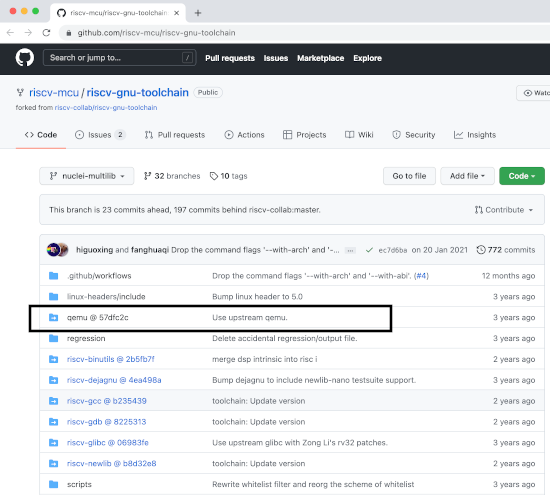How to build QEMU on macOS.
Information
QEMU (Quick EMUlator) is an open source virtual machine for Linux, Mac, Windows, with ports to various BSDs and sundry as well.
It supports a wide range of guest architectures – x86, the various flavors of ARM, m68k, S390x, and RISC-V.
QEMU can emulate both 32-bit and 64-bit RISC-V CPUs.
Use the qemu-system-riscv64 executable to simulate a 64-bit RISC-V machine, qemu-system-riscv32 executable to simulate a 32-bit RISC-V machine.
The RISC-V QEMU port is developed in the upstream QEMU repository.
More information about QEMU:
https://www.qemu.org/
Operating system used
macOS Monterey
Software prerequisites
Homebrew
Procedure
- This tutorial is a continuation of tutorial:
How to build the Nuclei RISC-V GNU Compiler Toolchain (riscv-gnu-toolchain) on macOS.
Please follow that tutorial first, otherwise the steps below do not make any sense.
The qemu submodule:

- The upstream qemu submodule location is:
https://git.qemu.org/git/qemu.git
See: ~/temp/riscv-gnu-toolchain/.gitmodules
- Goto qemu folder.
Type: cd ~/temp/riscv-gnu-toolchain/qemu
Type: git submodule update --init --recursive
- Create directory ~/temp/riscv-gnu-toolchain/qemu/build where the build is stored.
Type: mkdir build
- Create the Makefile.
Type: cd build
The --prefix option does not seem to work.
That is why I execute the configure script INSIDE the build directory.
Type: ../configure --target-list=riscv32-softmmu,riscv64-softmmu
Both riscv32-softmmu and riscv64-softmmu are being build.
More information about configure:
Type: ./configure --help
mmu stands for memory management unit.
- Build qemu, it will take approx. 5 min depending on your machine
Type: make
- The following tools were build:
~/temp/riscv-gnu-toolchain/qemu/build/riscv32-softmmu/qemu-system-riscv32
~/temp/riscv-gnu-toolchain/qemu/build/riscv64-softmmu/qemu-system-riscv64
- To build again, first delete generated files:
Type: make distclean && rm -rf *-linux-user *-softmmu"
- Instead of building QEMU yourself, you can install it using homebrew.
Type: brew install qemu
- QEMU is installed at:
/usr/local/bin/
qemu-edid
qemu-img
qemu-io
qemu-nbd
qemu-storage-daemon
qemu-system-aarch64
qemu-system-alpha
qemu-system-arm
qemu-system-avr
qemu-system-cris
qemu-system-hppa
qemu-system-i386
qemu-system-m68k
qemu-system-microblaze
qemu-system-microblazeel
qemu-system-mips
qemu-system-mips64
qemu-system-mips64el
qemu-system-mipsel
qemu-system-nios2
qemu-system-or1k
qemu-system-ppc
qemu-system-ppc64
qemu-system-riscv32
qemu-system-riscv64
qemu-system-rx
qemu-system-s390x
qemu-system-sh4
qemu-system-sh4eb
qemu-system-sparc
qemu-system-sparc64
qemu-system-tricore
qemu-system-x86_64
qemu-system-xtensa
qemu-system-xtensaeb
- In this tutorial I will be using the homebrew QEMU.
- Type: which qemu-system-riscv32
/usr/local/bin/qemu-system-riscv32
- Type: qemu-system-riscv32 --version
QEMU emulator version 6.2.0
Copyright (c) 2003-2021 Fabrice Bellard and the QEMU Project developers
- Type: qemu-system-riscv32 -machine help
Supported machines are:
none empty machine
opentitan RISC-V Board compatible with OpenTitan
sifive_e RISC-V Board compatible with SiFive E SDK
sifive_u RISC-V Board compatible with SiFive U SDK
spike RISC-V Spike board (default)
virt RISC-V VirtIO board
- More information about qemu-system-riscv32:
Type: qemu-system-riscv32 --help
See: qemu_system_riscv32_help.txt
- In tutorial How to build the Nuclei RISC-V GNU Compiler Toolchain (riscv-gnu-toolchain) on macOS, I created a hello program.
This program can be run using the qemu-system-riscv32 executable to simulate a 32-bit RISC-V machine.
Type: cd ~/temp
Type: qemu-system-riscv32 -machine virt -m 128M -bios none -device loader,file=./hello -nographic -s
- To terminate the QEMU terminal:
Press keys: CTRL + A
Press key: x
- I was not able to make QEMU to work.
|
